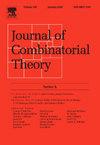Distributions of reciprocal sums of parts in integer partitions
IF 1.2
2区 数学
Q2 MATHEMATICS
引用次数: 0
Abstract
Let be the set of partitions of n into distinct parts, and be the sum of reciprocals of the parts of the partition λ. We show that as , Moreover, for , the set of ordinary partitions of n, we show that as , To prove these asymptotic formulas in a uniform manner, we derive a general asymptotic formula using Wright's circle method.
整数分区中各部分倒数之和的分布
设 Dn 是将 n 分割为不同部分的集合,srp(λ) 是分割 λ 的各部分的倒数之和。 我们证明,当 n→∞ 时,E[srp(λ):λ∈Dn]∼log(3n)4andVar[srp(λ):λ∈Dn]∼π224。此外,对于 n 的普通分区集合 Pn,我们证明当 n→∞ 时,E[srp(λ):λ∈Pn]∼πn6andVar[srp(λ):λ∈Pn]∼π215n。为了统一证明这些渐近公式,我们利用赖特圆法推导出一个一般渐近公式。
本文章由计算机程序翻译,如有差异,请以英文原文为准。
求助全文
约1分钟内获得全文
求助全文
来源期刊
CiteScore
2.90
自引率
9.10%
发文量
94
审稿时长
12 months
期刊介绍:
The Journal of Combinatorial Theory publishes original mathematical research concerned with theoretical and physical aspects of the study of finite and discrete structures in all branches of science. Series A is concerned primarily with structures, designs, and applications of combinatorics and is a valuable tool for mathematicians and computer scientists.

 求助内容:
求助内容: 应助结果提醒方式:
应助结果提醒方式:


